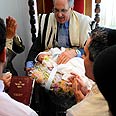
The Senate Judiciary Committee voted 5-0 for the bill by two Democratic lawmakers that would declare that circumcision - surgically removing the foreskin that covers the tip of the penis - has health, cultural and other benefits, and that uniform statewide rules are needed to govern it and a parent's authority over whether their children receive it.
"It's a medical procedure, and it has value," said Assemblyman Mike Gatto, D-Los Angeles, co-author of AB768. Passing the bill, he told the committee, would prevent a statewide patchwork of laws governing circumcision.
Sen. Noreen Evans, the Santa Rosa Democrat who chairs the committee, said she struggled with the decision on whether to circumcise her son. There is a clear need for a statewide standard that would ensure other parents retain the right to make that choice, she said.
The legislation comes against a national backdrop of efforts to limit male circumcision, which critics say is an unnecessary surgery to a healthy and defenseless child that can cause long-lasting sexual and mental health problems.
Supporters of male circumcision include researchers who say it can reduce the risk of sexually transmitted diseases and cancer, and many Jews and Muslims, for whom the practice is an important religious ritual.
Local ballot measures on the subject interfere with the practice of medicine, said Ryan Spencer, a spokesman for the California Medical Association.
"The decision to perform male circumcision should be left up to the parents in consultation with their physician, wherever they reside," Spencer testified.
Brian Levitt, a San Francisco resident who was circumcised as a child, said the bill's assertion that the practice is beneficial was biased and inaccurate.
"I stand before you as proof that the idea that circumcision definitely has positive bonding, health and sexual benefits is a lie," he testified.
'Government, police should not intervene'
Advocates have tried for years to advance circumcision bans at statehouses across the country with little success. In California, they turned their attention this year to local ballot measures.
The issue drew national attention when backers collected more than 7,700 signatures to put a measure on the November ballot in San Francisco to outlaw the circumcision of most male children. The measure was later rejected by a judge.
San Francisco resident Lloyd Schofield led the effort, which if approved would have made circumcision of boys younger than 18 a misdemeanor except in cases of medical necessity.
That restriction would have been too extreme, said Assemblywoman Fiona Ma, D- San Francisco, co-author of the bill.
"The government and the police should not be in the middle of who should and should not be circumcised," she told the committee.
What would have been the first vote on the practice in a US city became more controversial when the Anti-Defamation League accused proponents of the ban of using anti-Semitic caricatures to support their cause.
A group including Jewish and Muslim San Francisco residents sued in June to block the ballot measure. San Francisco Superior Court Judge Loretta Giorgi on July 28 ordered it struck from the ballot, ruling that California law says only the state, not cities, can regulate medical procedures.
Giorgi also said it violated protections of religious freedom guaranteed in the US Constitution.
If approved by the full Legislature and signed into law, the bill would short-circuit future attempts to pass local laws or ballot initiatives limiting male circumcision on medical or any other basis.
Gatto said that was necessary because Giorgi's ruling could be overturned on appeal. In addition, he said, circumcision of Jewish children is often performed by a religious specialist known as a mohel, who might arguably not be included among the "healing arts practitioners" covered by the state law on medical procedures.
Schofield said Tuesday that supporters of the San Francisco measure would decide by Friday whether they will appeal the court ruling.
Gatto and Ma are pursuing a two-thirds majority vote for the bill, which would allow the statewide standard to take effect immediately.
The bill next goes to the full state Senate, where it could be considered as soon as next week.
- Follow Ynetnews on Facebook















